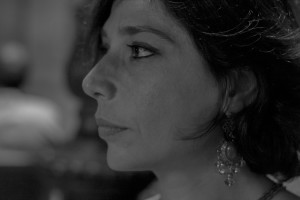 Six poems by Francesca Pellegrino, translated from the Italian by Adria Bernardi.
Six poems by Francesca Pellegrino, translated from the Italian by Adria Bernardi.
Francesca Pellegrino, by profession and training, is a geometra, which could be described as something similar to engineer-architect-and site foreman, not exactly one of these, but one whose work corresponds with the work of each, a designer-constructor of buildings and go-between to the real world of permits and codes — in her case with a specialization of roadways and bridges.
 The velocity of these poems, from her collection, Chernobylove—il giorno dopo il vento (The Day After the Wind) divert the eye and the mind from a kind of mathematical logic with which they are constructed; it’s the logic of a poet who is always unconsciously measuring spatial relationships in a kind of rigorous echoing of that evaporates when you try to apply a formula. Her poems follow the course of a glamorous heyday of love-and-prosperity to the train-wreck of Italy’s economic collapse and the rupturing of institutions after the big party: “The principle partner / was seen on a tropical island / sun always / wearing a suit / made with my hide. Completely hand stitched.” (“My bank is different”) These poems also represent particular poetic inheritances: the lyric poet engaged in the searing, relentless, self-examination and the exploration of Bitter-Love becoming something else. In addition to Chernobylove—il giorno dopo il vento (Kimerik 2010), Francesca Pellegrino has published Dimentico sempre di dare l’acqua ai sogni (Kimerik 2009), Niente di personale (Samizdat 2009); and a chapbook, L’Enunciato (Libraria Padovana 2008). Francesca Pellegrino is a coordinator of the literary magazine LibrAria. These poems appear in Chernobylove—The Day After the Wind Selected Poems 2008-2010 Selected, Edited, and Translated by Adria Bernardi (Chelsea Editions). Born in 1974, Pellegrino lives in Taranto.
The velocity of these poems, from her collection, Chernobylove—il giorno dopo il vento (The Day After the Wind) divert the eye and the mind from a kind of mathematical logic with which they are constructed; it’s the logic of a poet who is always unconsciously measuring spatial relationships in a kind of rigorous echoing of that evaporates when you try to apply a formula. Her poems follow the course of a glamorous heyday of love-and-prosperity to the train-wreck of Italy’s economic collapse and the rupturing of institutions after the big party: “The principle partner / was seen on a tropical island / sun always / wearing a suit / made with my hide. Completely hand stitched.” (“My bank is different”) These poems also represent particular poetic inheritances: the lyric poet engaged in the searing, relentless, self-examination and the exploration of Bitter-Love becoming something else. In addition to Chernobylove—il giorno dopo il vento (Kimerik 2010), Francesca Pellegrino has published Dimentico sempre di dare l’acqua ai sogni (Kimerik 2009), Niente di personale (Samizdat 2009); and a chapbook, L’Enunciato (Libraria Padovana 2008). Francesca Pellegrino is a coordinator of the literary magazine LibrAria. These poems appear in Chernobylove—The Day After the Wind Selected Poems 2008-2010 Selected, Edited, and Translated by Adria Bernardi (Chelsea Editions). Born in 1974, Pellegrino lives in Taranto.
– Adria Bernardi
La mia banca è differente
by Francesca PellegrinoIl mio cuore è un rosso fisso
fallimentare
tra crediti mai risarciti d’amore
ed interessi di mora
da pagare sull’unghia.
Al portatore.
. . .
Sono l’ultima della fila
al banco dei pegni.
Spero che l’omino sia buono con me
che mi dia almeno due centesimi
ho da pagare una bolletta
per tutte le ore
che ho nella borsa
investite in quelle azioni
che sono poi andate. Fottute.
Fallite.
Il socio capogruppo
lo hanno visto su un’isola tropicale
sempre il sole
che portava un vestito fatto
con la mia pelle. Tutto cucito a mano.
Gli stava da Dio, così come
l’ho amato
ma sapendo la poca cura
che ha avuto di tutto il tempo mio
resterà nudo, prima che faccia notte.
E freddo.
My bank is different
by Francesca PellegrinoMy heart is a fixed red
bankruptcy
between debts of love never repaid
and interest on defaults
to be paid on the nail.
To the bearer.
. . .
I am last in line
at the pawnshop counter
and I hope the small fellow will do right by me,
grant me at least two centimes
I have to pay a bill
for all the hours
I invested in the market in those shares
that were then lost. Fucked.
Failured.
The principle partner
was seen on a tropical island
sun always
wearing a suit
made with my hide. Completely hand stitched.
He wore it divinely, just the way
I loved him
but knowing the slipshodness
he used with all my time
he will remain naked, before it gets dark.
And cold.
translated from Italian by Adria BernardiIl diavolo azzurro, di famiglia nobile
by Francesca PellegrinoEra un grand’uomo, lui
c’è da dirlo. Impettito di tutto spillo e
mi portava a spasso al braccio
sempre che io non parlassi troppo
o troppo poco. Potevo fare pipì
ma solo se non avevo esagerato
a saziare la sete. E l’amore sulle unghie.
E potevo baciarlo
solo se asciugavo bene bene
la bocca coi silenzi
respirando il giusto, senza
esagerare, come stare con l’anima
in mezzo ai ferri—stretta di morsa stretta
la lingua. Che neanche una preghiera
si poteva. Neanche una preghiera.
Era un grand’uomo. Davvero davvero
lui, che si pettinava i capelli
all’ultimo grido mio, per ore e ore e ore.
E poi, una cosa buona, anzi due,
la fece una sera, quando andò via,
brav’uomo, lui
che aveva altre fiche da marcire
senza dimenticare lasciarmi il figlioamoremio
e prendere lo shampoo.
PrinceHarming, of noble origins
by Francesca PellegrinoHe was a very important man, he was,
no two ways about it. Walking tall, slim,
and he always ushered me around by the arm
provided I didn’t talk too much
or too little. I was permitted to pee but only if
I hadn’t exaggerated
satiating thirst. And love
on the fingernails. And I could kiss him
only if I dried my mouth
very well with silences
breathing appropriately
without exaggerating, like having the soul
in fetters—tongue cinched
with cinched grip. Not even a plea was allowed.
Not even a plea. He was a very important man. Really
and truly. Really he was. He would comb his hair
in the latest crazy craze, for hour upon hour upon hour.
And then, one good thing, two, actually
one evening, he did this, when he went away,
he was a good man,
who had other cunts to let rot
without forgetting to leave me
the sonloveofmylife and take the shampoo.
translated from Italian by Adria BernardiNella pentola non c’era il sugo
e neanche il coperchio
by Francesca PellegrinoNon sapevo che le tempeste
intorno avessero sempre e solo
tempeste. Non lo sapevo.
E così vanno anche i minuti
uno dietro l’altro
di fretta
a mozzicare i culi delle persone
coi denti intartarati.
E so di qualcuno
che si era pure inventato
un gioco nuovo
qualcosa come una parentesi che apriva
e dentro c’era una bambola
che aveva un figlio di pezza pure lui.
Ma facevano le lacrime vere
con gli occhi.
Poi, quando si era fatta una certa
chiudeva la parentesi
e tornava a girare il vuoto
nel vuoto, di tutto il niente del niente
che era.
Nothing in the pot,
Not even a lid
by Francesca PellegrinoI didn’t know that storms
were always and only surrounded
by storms. I did not understand that.
And in this way even the minutes follow
one right after the other
in a rush
ass-biting people
with entartared teeth.
And I know of someone
who even invented
a new game
something like a parenthesis that opened up
and inside there was a ragdoll
which had a ragdoll baby that was part him.
However they cried true tears
from their eyes.
Then, when it got late
he closed the parentheses
and returned to spinning the void within
the void of all of the nothings of nothings
that were.
translated from Italian by Adria Bernardi


